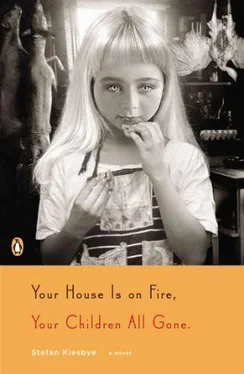“Yet it won’t get any better,” Olaf said. “I tried, and yet she resists me.”
“It still might,” Jan said. “It still might. My wife and I,” he raised his new hand into the air and waved it in front of Olaf’s face, “we’ve had our ups and downs. When we’re alone, she kills all the lights so she doesn’t have to see who’s touching her.”
“But you…,” Olaf said and immediately stopped himself.
“I am crippled, sure.”
“I’m sorry, Jan,” Olaf said. “I really am.”
Jan continued without listening to Olaf’s apologies. His voice became quieter and sweeter still. “But there are far more ugly things than my hand.”
“What are you saying?” Olaf said, and Alex could see his brother’s face flush and his shoulders tighten.
“You were gone for a long time, a long time for a young girl. People doubted you’d be back. She is beautiful.”
“You’re drunk,” Olaf said. “I won’t stand for your talk.”
“Oh you want to punch me like your old man did? First you cripple me and then you hit me? But you’re right,” he said and got up from his stool, smiling once more, his voice still as quiet and pleasant as before. “I’m drunk.” He left Olaf to rejoin the small group of workers from Brümmer’s. But before he did, he turned to Olaf once more. “All the bad things I could wish on you, you’ve already done to yourself. Go home, Sailor. Tell Liese Fitschen her Veronika looks just as cute as her mother.”
That night Olaf did not go to sleep. Alex kept him company long after the inn had closed. The two brothers were alone and drank; Olaf did not dare enter his wife’s bedroom.
In the early morning, they were already standing outside the Fitschens’ gate, waiting for Liese and her little girl to appear. Alex has assured me that he tried to dissuade his brother from doing so, but he wouldn’t listen. When Liese and Veronika finally stepped out onto the street and greeted their neighbors, they didn’t receive an answer. Instead Olaf picked up the child and stared at her face.
“What are you doing?” Liese asked with suspicion in her voice, but Alex motioned for her to keep quiet.
“She looks nothing like you,” Olaf said.
“Let go of her,” Liese demanded. “She’s mine.”
The girl started to cry. She had Hilde’s mouth, her round cheeks. She even had the same large blue eyes.
“It can’t be,” Olaf said and turned to his brother. But Alex nodded without a word. The likeness couldn’t be denied.
“You can’t take her,” Liese said and started to cry herself. “She’s mine.”
“When was she born? I’ll strangle her if you don’t answer me.” Olaf took hold of the girl’s soft braids.
“Four years ago, in March, four years. She’s mine, she’s mine I swear. I swear to you, Olaf, she’s mine.”
“You’re lying,” Olaf said, but finally he set down the girl, whose face was wide with fear. “She’s her daughter, Hilde’s girl. Jan knows the truth. Probably the whole village knows you’re lying to me.”
When the two brothers returned home, Hilde stood in the living room and behind her appeared Bernd Frick. The lines in the old man’s face appeared even deeper than usual. “I heard the ruckus outside,” Hilde said. “I was worried. What did you want from Liese?”
“The girl is your daughter,” Olaf said, his words barely slipping past his tongue. “Who is the father?”
“Nonsense,” Bernd Frick said. “What an idea.”
“Why do you deny it? She looks like Hilde. Why did you give her away? Who is the father? Who?”
For a long time nobody spoke. Hilde stood with her gaze directed toward the floor and her bare feet. Finally Olaf’s father said, “She thought you were dead.”
“And you covered it up for her. Took her to Liese.” Olaf took a few steps forward and struck his father with his fists. The older man’s head flew back and then his knees buckled; he slumped to the floor.
With a shriek, Hilde flew toward Bernd, covering his head with her hair. She held him tight, rocking him, stroking his cheeks. “Yes,” she said to Olaf, “we both hoped you’d never come back.”
When asked what had happened to Olaf Frick, people in Hemmersmoor shrugged. “The call of the sea,” the baker volunteered. “All these years in those godless countries, they leave a mark on you.”
The mailman wouldn’t say; he never received another postcard from Shanghai or Macao. Soon enough, the village girls redirected their attention to Rutger von Kamphoff, who looked even more suave now that he was wearing black. He was once more available, and every young woman wanted to know how in the world she could get invited to the manor.
Jan Hussel, when asked, stroked the black fingers of his prosthetic hand. “Stupid affair,” he said and shook his head. “He could have made good after all.” He seemed genuinely distressed and said that he regretted not having had the opportunity to talk to Olaf one last time.
Listening to Jan’s answer, Alex shrugged. He had made me swear not to betray his secret; he had to protect the family’s reputation as well as its business. He wouldn’t always be the von Kamphoffs’ driver. Whenever the people in the village mentioned Olaf, he shook his head. “Not enough life around here.”
Through my scholarship, which I started in the fall, I stayed in contact with the Big House, and sometimes I received an invitation to one of the dinner parties there. My mother was beside herself with joy, and when the black Mercedes stopped in front of our house, she would have liked to gather the whole neighborhood to watch me get into the car. “Rutger has an eye on you,” she reassured me each and every day. “Keep in close touch with him.” She didn’t know just how well I followed her advice. I kept quiet about the meetings Rutger arranged for us from time to time, and which he kept secret from his family. He still wore black.
One day in the spring, just before Easter, I came home to find the house empty. My mother had pushed my lunch into the oven, and in her note, which I found on the kitchen table, she wrote that she would spend the afternoon in Groß Ostensen. My dad was working on the fields with my brothers and wouldn’t be home before dinner.
I sighed in relief. The more time I spent at the Big House, the smaller my own home seemed to become. I hated the smells that wafted from our kitchen through the whole house, and I couldn’t watch my father eat anymore. It was horrible how noisily he slurped his soup; after every bite of meat he scratched between his teeth with his fingernails. My brothers chewed with their mouths open while continuing their conversations. I was only too happy not to find any of them at home. I’d be able to prepare for my rendezvous with Rutger undisturbed. The chauffeur would pick me up at four o’clock.
Rutger’s marriage with Anna Frick had scandalized his family, and only Frick’s money had finally convinced Bruno von Kamphoff and his wife to relent. Anna had been one of us, a village beauty with rosy cheeks and without manners. I knew what happened when girls like us got mixed up with people like the von Kamphoffs. And even though I sensed that Rutger meant well, I had not entirely given in to his greed. My dad wasn’t as rich as Frick. I had only my young skin and my brown hair. Nobody had touched me yet.
This is what I thought while washing myself and putting on a new dress, one that Rutger hadn’t yet seen dozens of times. I brushed my hair and pushed away pictures of my friend Linde. How much better was I prepared to take advantage of the opportunity I was given. She would only have squandered it. And, anyway, her face was disfigured—she had even less to offer the future heir of the Big House.
Читать дальше












